Top stories
الاحتفال بيوم استقلال أرض الصومال الثالث والثلاثين: انتصار للصمود والأمل

يمثل يوم 18 مايو يومًا مهمًا في قلوب سكان أرض الصومال حيث يحتفلون بيوم استقلالهم، حيث يحتفلون بمرور 33 عامًا على استعادة سيادتهم من الصومال. إن هذا اليوم غارق في التاريخ والصمود والفخر، ويعود تاريخه إلى 18 مايو 1991، عندما أعلن مؤتمر بوراو استقلال أرض الصومال. ويتناول هذا المقال أهمية هذا الاحتفال والمسيرة التاريخية والتطلعات المستقبلية.
السياق التاريخي
إن سعي أرض الصومال إلى الاستقلال له جذوره في ماضيها الاستعماري. في 26 يونيو 1960، حصلت أرض الصومال على استقلالها عن المملكة المتحدة. ومع ذلك، فإن هذا الاستقلال لم يدم طويلاً حيث انضمت طوعاً إلى الصومال بعد خمسة أيام لتشكيل الجمهورية الصومالية. ومع ذلك، كان الاتحاد محفوفًا بالتحديات، مما أدى إلى عقود من الاضطرابات المدنية وحرمان سكان أرض الصومال من حقوقهم.
وجاءت اللحظة المحورية في عام 1991، وسط انهيار الحكومة الصومالية، عندما جمع مؤتمر بوراو ممثلين من جميع مناطق أرض الصومال. وكان هذا المؤتمر لحظة فاصلة، حيث أدت مشاورات مكثفة إلى اتخاذ قرار بالإجماع باستعادة سيادة أرض الصومال. وكانت هذه الخطوة الجريئة بمثابة بداية حقبة جديدة لأرض الصومال.
أهمية الاحتفال
إن الاحتفال بمرور 33 عامًا على الاستقلال ليس مجرد انعكاس للماضي، بل هو احتفال بمرونة أرض الصومال وإنجازاتها وتطلعاتها. ويتميز هذا اليوم بالمسيرات والخطب والعروض الثقافية في جميع أنحاء البلاد، حيث أصبحت العاصمة هرجيسا مركزًا للاحتفالات. ويشارك المسؤولون الحكوميون والقادة السياسيون والطلاب والعسكريون في هذه الأحداث، مما يظهر الوحدة الوطنية والفخر.
استذكار التضحيات والإنجازات
ويأتي الاحتفال بمثابة تكريم للتضحيات التي قدمها أبناء أرض الصومال لتحقيق الحرية والأمن والاستقرار. إنه يوم لتكريم التقدم المحرز منذ عام 1991، بما في ذلك وضع دستور، وحكومة فاعلة، وقوة عسكرية وشرطة قوية، والنقل الناجح للسلطة بين خمسة رؤساء.
على الرغم من عدم الاعتراف بها دوليًا، فقد خطت أرض الصومال خطوات كبيرة في مجالات الحكم والأمن والتنمية الاقتصادية. فهي تمثل منارة للاستقرار والديمقراطية في القرن الأفريقي، وشهادة على ما يمكن تحقيقه من خلال التصميم والوحدة.
يتطلع إلى المستقبل
إن الذكرى السنوية الثالثة والثلاثين ليست مجرد وقت للتأمل، ولكنها أيضًا فرصة للتطلع إلى المستقبل. ويذكّر سكان صوماليلاند أنفسهم بمسؤوليتهم عن الدفاع عن حريتهم وسيادتهم التي حصلوا عليها بشق الأنفس. يرمز هذا اليوم إلى الأمل في الاعتراف الدولي، وهو الهدف الذي لا يزال بعيد المنال ولكنه حاضر دائمًا في قلوب الناس.
وتزيد الانتخابات الرئاسية المقبلة في 13 نوفمبر 2024 من أهمية الاحتفال هذا العام. ومن المقرر أن يشارك أكثر من 1.2 مليون ناخب مسجل، مما يظهر قوة العمليات الديمقراطية في أرض الصومال. وتعد هذه الانتخابات، التي تأخرت بسبب الصراعات الإقليمية، خطوة حاسمة في إعادة تأكيد التزام أرض الصومال بالديمقراطية والحكم الرشيد.
تعزيز الوحدة الوطنية
إن احتفالات هذا العام مؤثرة بشكل خاص نظراً للتحديات التي تمت مواجهتها في العام الماضي، بما في ذلك صراع لاسانود. إن الوحدة التي أظهرها سكان صوماليلاند في مواجهة التهديدات الخارجية هي شهادة على قدرتهم على الصمود. وتعد هذه الاحتفالات بمثابة نقطة تجمع لتعزيز الوحدة والتضامن الوطني.
احتفالات المغتربين
يلعب المغتربون في أرض الصومال دورًا حيويًا في هذه الاحتفالات، حيث يقومون بتنظيم الفعاليات في جميع أنحاء أوروبا وأمريكا الشمالية والشرق الأوسط وأفريقيا. ولا تحتفل هذه التجمعات باستقلال أرض الصومال فحسب، بل تروج أيضًا لإنجازاتها على الساحة الدولية. تعتبر جهود المغتربين حاسمة في الدعوة إلى الاعتراف بأرض الصومال وإظهار التقدم الذي أحرزته البلاد.
أهمية ثقافية
يعد العلم الوطني رمزًا مركزيًا خلال الاحتفالات، حيث يعرضه سكان صوماليلاند بفخر على منازلهم وسياراتهم وملابسهم. أطفال المدارس يلوحون بالعلم في المسيرات، ويتم أداء الأغاني والرقصات التقليدية، مما يسلط الضوء على التراث الثقافي الغني لأرض الصومال. لا يمثل العلم هوية البلاد فحسب، بل يمثل أيضًا فخر شعبها ووحدته.
دور الشباب
شباب أرض الصومال يتصدرون الاحتفالات، ويجسدون روح الأمة وأملها. ويشاركون في أنشطة مختلفة، من غناء الأغاني الوطنية إلى أداء الرقصات التقليدية، لإظهار وطنيتهم والتزامهم بمستقبل البلاد. إن مشاركتهم هي شهادة على الطبيعة النابضة بالحياة والديناميكية لجيل الشباب في أرض الصومال.
الآفاق المستقبلية: مذكرة تفاهم مع إثيوبيا
ومن التطورات المثيرة التي تزامنت مع احتفال هذا العام اتفاقية مذكرة التفاهم المرتقبة بين أرض الصومال وإثيوبيا، والتي يمكن أن تمهد الطريق للاعتراف الدبلوماسي الرسمي. هذه الاتفاقية، والتي تشمل
شراكة استراتيجية يمكنها تعزيز الاستقرار الإقليمي والتكامل الاقتصادي. إنها علامة تبعث على الأمل بأن سعي أرض الصومال للحصول على الاعتراف الدولي قد يؤتي ثماره قريبًا.
خاتمة
بينما تحتفل أرض الصومال بعيد استقلالها الثالث والثلاثين، فإنها تقف بمثابة شهادة على الصمود والأمل والتقدم. وعلى الرغم من عدم الاعتراف الدولي، نجح سكان أرض الصومال في بناء دولة مستقرة وديمقراطية ومزدهرة. إن احتفالات يوم 18 مايو هي بمثابة تذكير بالتضحيات التي تم تقديمها والإنجازات التي تم تحقيقها، فضلاً عن التطلع إلى مستقبل يتم فيه الاعتراف بأرض الصومال واحترامها على المسرح العالمي.
إن رحلة أرض الصومال هي رحلة تصميم ووحدة، وبينما يحتفلون بهذا المعلم الهام، فإن الأمل في مستقبل أكثر إشراقًا ومعترف به لا يزال يلهم شعبها. إن الذكرى السنوية الثالثة والثلاثين ليست مجرد احتفال بالماضي، بل هي منارة أمل لما ينتظرنا في المستقبل لهذه الأمة الرائعة.
بقلم قاسم عبد القادر:
Top stories
Trump’s Africa Reset: Cuts, Chaos, and a Cold New Order
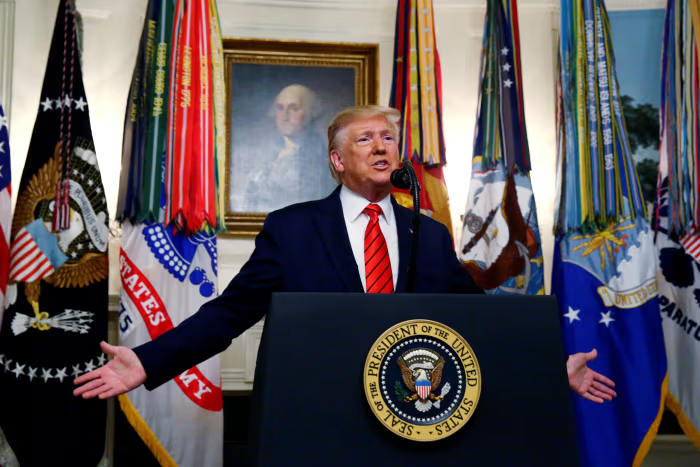
From aid slash to embassy closures, Trump’s policy shift could ignite a diplomatic vacuum China is ready to fill.

Trump’s “America First” Africa policy is gutting aid, shuttering embassies, and demanding raw deals. Critics say it’s reckless. Supporters call it a long-overdue reset.
Donald Trump’s foreign policy toward Africa is no longer a mystery—it’s a warning shot. The continent once viewed as a strategic partner in global development is now being treated by the Trump White House as expendable, chaotic, and transactional.
Gone are the days of idealistic aid and quiet diplomacy. In their place: canceled health programs, closed embassies, and threats of visa bans. The dismantling of USAID and a quiet culling of programs like PEPFAR mark not just policy shifts—they mark America’s retreat from its post-Cold War role as Africa’s top partner.
According to White House officials, this isn’t abandonment—it’s “realignment.” Under Trump’s new rules, African countries must offer minerals, trade deals, port access, or diplomatic loyalty—or they’ll get nothing.
This model is brutal. It ignores humanitarian impact and gives leverage only to nations with something to sell. Countries like Somalia are offering port control. Congo is bartering minerals. South Africa? Cast into diplomatic exile for its stance on Israel and Afrikaner politics.
But the risk is not just moral. It’s geopolitical. The Trump administration is handing China the clearest opening it’s had in decades to dominate Africa’s markets, infrastructure, and soft power. Senator Chris Coons put it bluntly: “We’ve handed them the best possible opportunity.”
Behind closed doors, Trump officials scoff at the China panic. “It’s a myth,” one says, dismissing warnings as aid-industry propaganda. They argue that China’s loan-heavy model is unsustainable and predatory, whereas Trump’s blunt-force trade-first approach is “healthier for African societies.”
But that “healthier” vision doesn’t feed HIV patients, rebuild schools, or keep peacekeepers funded. And while Trump’s allies claim the aid era was exploitative and wasteful, cutting programs without building real economic alternatives is a gamble that could destabilize already fragile governments.
In short: Trump hasn’t just broken with Africa’s past—he’s set the entire continent adrift, daring it to sink or swim.
Somalia
US offers $5M bounty for senior ISIS figure
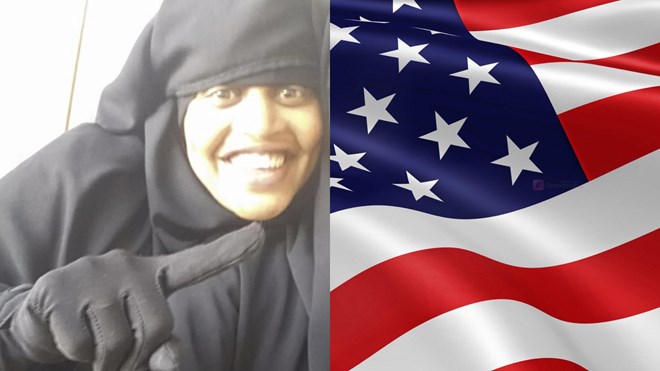
Khadra Issa, alias Ummu Qaqaa Somalia, named as top ISIS operative as U.S. intensifies hunt for diaspora-linked extremists
The U.S. government has put a $5 million bounty on the head of Khadra Issa, also known as Ummu Qaqaa Somalia, a Somali-born Dutch national accused of serving as a key recruiter, propagandist, and operative for ISIS. Her case sends a chilling message: ISIS is no longer confined to the ruins of Raqqa—it’s networked, mobile, and still recruiting, often through diaspora channels.
Issa’s profile paints a dangerous archetype. Fluent, digitally agile, and invisible for years, she allegedly helped orchestrate suicide bombings, child concealment, and online radicalization—while operating far from the battlefields. Most shocking is her alleged role in hiding two American children after their mother died in a U.S. airstrike. The fate of those children remains unknown, a haunting reminder of ISIS’s global entanglements.
Her name is now featured on the Rewards for Justice program’s most-wanted list. This designation means the U.S. considers her a high-priority target—someone embedded in extremist networks still capable of regenerating threats worldwide.
Washington’s move is not just punitive—it’s strategic. With ISIS’s territorial grip gone, its strength lies in the shadows: in encrypted apps, digital outreach, and transnational sympathizers like Issa who blur lines between citizen and combatant.
Security experts warn that Somali-origin operatives have become critical nodes in ISIS’s decentralized revival strategy. These individuals often possess EU or Western passports, allowing them to cross borders, mask affiliations, and embed within migrant communities—becoming radical hubs.
This case also raises larger questions. How did a European national of Somali descent reach this level of influence in a terror organization? How many more are under the radar? And why has the international community failed to dismantle these recruitment pipelines?
Khadra Issa is not just a fugitive—she’s the face of modern jihadist insurgency. And as the U.S. dangles millions for her arrest, one thing is clear: the war on ISIS may be out of the headlines, but it’s far from over.
Commentary
Fall of the Caliphate: Puntland Delivers Crushing Blow to ISIS in Somalia

After years of entrenchment, ISIS-Somalia’s last major bastion crumbles under Puntland’s offensive.
Puntland’s latest offensive in the Calmiskaad Mountains isn’t just a military success—it’s a symbolic decapitation of ISIS-Somalia’s regional ambitions. By seizing Togga Miraale, the crown jewel of ISIS’s mountain redoubts, Puntland security forces have dismantled what analysts long described as the terror group’s last command node in the region. The caliphate fantasy is over, at least in Puntland.
This wasn’t a victory won overnight. The month-long campaign through treacherous terrain and entrenched positions was a surgical war of attrition. ISIS fighters, once emboldened by their remote stronghold and a steady supply of weapons, were ground down. With captured stockpiles and dislodged militants, Puntland has dealt ISIS a blow from which it may never recover in northeastern Somalia.
This is more than just a win for Puntland. It’s a pivotal shift in the asymmetric war against jihadist movements in the Horn. While Al-Shabaab remains a dominant threat further south, ISIS-Somalia’s collapse exposes the vulnerability of jihadist splinter factions when faced with sustained, locally-led counterterrorism backed by strategic intelligence.
Moreover, this win couldn’t come at a more geopolitically significant time. As Somalia reels from recent setbacks—including the fall of Aadan Yabaal to Al-Shabaab—Puntland’s success highlights a stark contrast in governance, security, and military capability. It sends a potent message: decentralized Somali regions like Puntland can, and will, defend their territory where the federal government has failed.
Regional players like the UAE and the U.S., both of whom quietly supported this operation with air surveillance and intel, are taking note. So should Mogadishu. As the Somali government continues to lose ground to terrorists in the south, Puntland’s battlefield dominance is not just a local triumph—it’s a rebuke of Somalia’s fragile security architecture.
The caliphate in Somalia didn’t fall with fanfare—it collapsed under the pressure of a region that refused to yield. Puntland now owns the victory. And ISIS-Somalia? It’s a name soon to be remembered only in past tense.
Somalia’s Jihadist Boom: The Islamic State Is Stronger, Richer, and More Deadly
U.S. and UAE Joint Operation Kills 16 ISIS Militants in Puntland Stronghold
Puntland Airstrikes Devastate ISIS Strongholds, Killing Over 30 Fighters
Puntland Claims it Uncovered ISIS Treatment Sites, Business Links in Somaliland
Telegram Shuts Down Key ISIS Propaganda Channel Amid Puntland Conflict
Puntland Forces Close in on ISIS Stronghold, Final Battle Nears
Puntland Forces Crush ISIS Strongholds in Togga Jaceel Offensive
Puntland Clerics Rally Support for Military Offensive Against ISIS in Al-Miskaat Mountains
Puntland Would be Happy to Host Gazan Refugees: Puntland Deputy Minister
In Puntland’s rugged mountains, ISIS builds a dangerous foothold
Senior ISIS Commander Captured in Puntland as U.S. Airstrikes Cripple Somalia’s Jihadist Network
Puntland Cracks Down on Illegal Foreign Nationals Amid Extremism Concerns
Landmine Explosion Kills 13 Puntland Soldiers in Counter-Terrorism Mission
Puntland Forces Strike Major Daesh Strongholds in Bari Region
Islamic State Claims Responsibility for Deadly Puntland Military Base Attack in Somalia
Puntland Deputy Speaker Survives ISIS Attack Amid Rising Threat
Puntland Forces Uncover Major Weapons Cache, Arrest Al-Shabaab and ISIS Suspects in Bosaso
Middle East
The Iran Leak that Shook Israel’s Security State

Did Netanyahu just leak Israel’s war plans to save his image? Netanyahu under fire after NYT bombshell reveals Israeli plans to strike Iran; officials call it “one of the most dangerous leaks in Israel’s history.”
A crisis is unfolding in Israel—not just over Iran’s nuclear threat, but over a leak that’s ignited a political firestorm in Jerusalem. A senior Israeli official has told The Jerusalem Post that the recent New York Times report detailing Israeli plans to strike Iran’s nuclear program with US support is “one of the most dangerous leaks in Israel’s history.”
This isn’t just about national security. It’s about political survival.
Prime Minister Benjamin Netanyahu now finds himself at the center of a storm, with multiple Israeli politicians accusing him of deliberately leaking the classified operation details to shield himself from political fallout. His critics argue that the leak served as a distraction—a calculated maneuver to silence accusations that he talks tough on Iran but fails to deliver decisive military action.
Former defense minister Avigdor Lieberman didn’t hold back, tweeting: “How lucky we were that Netanyahu wasn’t prime minister when we bombed the nuclear reactors in Syria and Iraq.” His point? Past leaders acted. Netanyahu, critics say, leaks.
The revelation that Israel seriously weighed a joint strike with the US against Iran’s nuclear facilities—one that could have started a regional war—has sent shockwaves across both the intelligence and military communities. Not only was the IDF reportedly prepared to carry out the operation, but the entire strategy was contingent on US approval, which Trump ultimately denied in favor of diplomatic talks.
Now the damage is twofold: Iran has been tipped off, and Israel’s deterrence narrative has taken a hit.
While Netanyahu continues to claim that Iran will never be allowed to go nuclear on his watch, the Israeli public and global observers are left wondering: Did he just sabotage one of the most sensitive defense strategies of the decade—for the sake of headlines?
This leak doesn’t just threaten operational secrecy. It weakens trust within Israel’s security establishment, sends mixed signals to Tehran, and erodes confidence among US allies. In the end, the greatest threat to Israeli security might not come from Iranian centrifuges—but from within Israel’s own political machinery.
Top stories
Al-Shabaab’s Resurgence Exposes Flaws in Somalia’s War Strategy

Militant capture of Aadan Yabaal questions Mogadishu’s military momentum amid eroding public trust and fragile international support.
The fall of Aadan Yabaal to Al-Shabaab isn’t just a battlefield loss—it’s a strategic and psychological blow to the Somali government’s credibility. President Hassan Sheikh Mohamud’s attempt to reassure the nation that “momentum shifts” are part of war may ring hollow to a public that’s heard the same line since the early 2000s. After two years of claiming gains, how did the jihadists storm a symbolic stronghold with apparent ease?
Al-Shabaab’s capture of Aadan Yabaal shows the Somali military’s offensive was never as comprehensive or irreversible as claimed. Frontline forces remain underfunded and stretched thin. Tactical vacuums and inconsistent control of retaken towns are leaving doors wide open for ambushes. If elite units can’t hold strategic hubs like Aadan Yabaal, then what is really under government control?
President Mohamud’s warning about waning international support is an admission of dependency—Somalia’s war effort hinges more on foreign aid than national resolve. With US counterterrorism strikes declining, AMISOM rebranded into a lighter version, and donor fatigue mounting, the illusion of “progress” is rapidly dissolving. Al-Shabaab isn’t just surviving—it’s adapting, exploiting weaknesses, and regaining ground.
The president may plead for morale, but it’s morale in Mogadishu that’s collapsing. Every time Al-Shabaab plants its flag in a reclaimed town, it sends a louder message: Somalia’s government doesn’t have a monopoly on violence—or on legitimacy. Community militias like Ma’awisleey may be willing to fight, but they can’t hold ground without serious logistical backing. Without air support, intelligence coordination, and a functioning national army, this war will keep repeating itself.
If Somalia wants to avoid becoming a permanent failed state, its leaders must stop spinning failures into PR soundbites and start admitting the cracks in the system. The enemy is inside the walls—and still marching.
EDITORIAL
Somaliland’s Political Class: Selling Out a Nation for Profit

Somaliland’s greatest obstacle isn’t foreign policy — it’s internal corruption, nepotism, and betrayal from politicians who profit while the nation suffers. WARYATV exposes the rot.
While the people dream of recognition, their leaders cash in on betrayal.
Somaliland’s path to recognition has never been blocked by Mogadishu, Ethiopia, or even the UN. It has been sabotaged from within. Behind the speeches and flag-waving lies an elite class of politicians and businessmen who treat the nation not as a cause to fight for, but as a franchise to milk.
These men—most unelected, many unqualified—have spent decades playing the long game of stagnation. They talk sovereignty while banking silence. They chant patriotism while laundering public funds. And worst of all, they have created a system where anyone smart enough to challenge the decay is labeled a threat.
This is the intellectual apartheid of Somaliland: Educated minds are shunned, sidelined, and smeared because they expose what the ruling class desperately wants to hide—their fear of change, their fear of meritocracy, and their fear of losing control.
The result?
- Corruption reigns unchecked.
- Healthcare and education are abandoned.
- National planning is a joke.
- Recognition is sabotaged deliberately—because an internationally recognized state comes with rules and transparency, and that threatens the clan cartel currently in charge.
Somalilanders aren’t poor because of geography. They’re poor because the elite keep them that way. They’re told to wait, to pray, to believe in “diplomatic progress” while deals are cut behind closed doors and loyalty is bought, not earned. And the biggest betrayal? Business elites who actively oppose recognition, because they fear competition more than they love their flag.
Hadrawi warned us. Intelligence is punished. The thinkers, the visionaries, the honest ones—they are exiled, not by the world, but by their own people in power.
Somaliland isn’t failing because of external pressure. It’s failing because of internal cowardice. A nation hijacked by men who want the title of president, not the responsibility of statehood.
The people must stop idolizing thieves and start demanding truth. Somaliland’s dream is not dead—but it’s being strangled in silence.

Time to break the silence.
Analysis
America Pulls the Plug on Somalia: UN Funding Blocked, AUSSOM on the Brink

Trump eyes embassy closures as US rejects UN plan to fund peacekeepers in Somalia — Mogadishu’s last lifeline in peril.
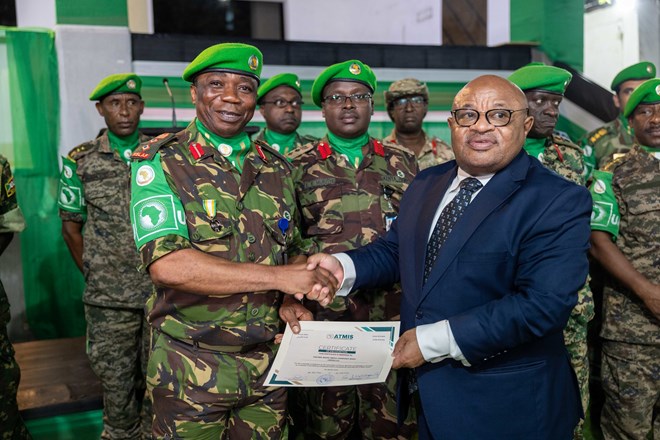
The US shocks the UN by rejecting funding for African Union forces in Somalia, just as Trump weighs closing the US Embassy in Mogadishu. With Al-Shabaab advancing and oil politics heating up, is Somalia doomed to implode?
The United States just signaled the collapse of Somalia’s last fragile security architecture — and it did so with chilling clarity. Washington has publicly rejected UN efforts to fund the African Union Stabilization Support Mission in Somalia (AUSSOM), effectively gutting any hope for predictable peacekeeping operations in a country teetering on the edge of collapse.

This isn’t just a bureaucratic snub — it’s a geopolitical death sentence for Somalia. Al-Shabaab militants are already testing the vacuum, launching a multi-pronged assault on Adan Yabaal, a key military base in Middle Shabelle. If confirmed, the town’s fall would mark the largest strategic loss since Somalia launched its offensive against terror in 2022.
UN Secretary-General António Guterres warned the Security Council: no funding, no peace. But the US—under Trump’s second-term posture—is slamming the door shut, labeling Somalia as unfit for a hybrid funding model under Resolution 2719. Diplomats are in a panic. Meanwhile, Trump is reportedly planning to close up to 30 diplomatic missions, with Mogadishu’s embassy topping the list.
Somalia’s response? Desperation disguised as diplomacy. The FGS is now peddling oil blocks in contested territories like Nugaal Valley. In a flashy announcement on X, Somalia’s ambassador to the US declared “Somalia is open for drilling,” targeting American firms with an offer it legally and militarily cannot secure.
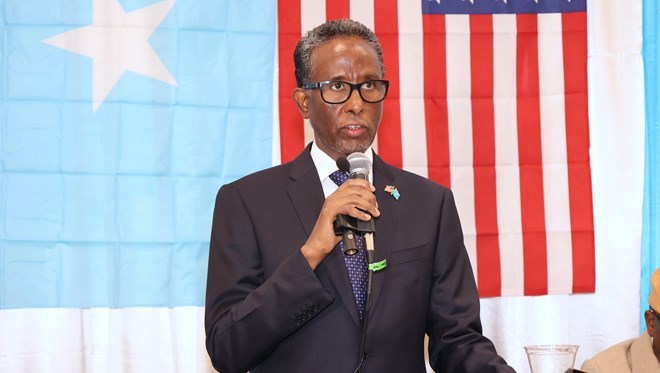
Somalia’s Ambassador to the United States, Dahir Hassan Arab
The move comes after Somalia’s recognition of SSC-Khaatumo — a region still engulfed in the political wreckage of its war with Somaliland.
This isn’t about development. It’s about weaponizing recognition, resource manipulation, and fake sovereignty in a bid to win Trump’s favor and undermine Somaliland’s momentum.
But while Hargeisa builds forests and attracts foreign media praise, Mogadishu is drowning in debt, insurgency, and denial. The West is tuning out, and even the UN is losing patience. The US, once Somalia’s diplomatic oxygen, is now pulling the plug.
Somalia is not rising — it’s being unplugged.
Commentary
China Slaps Trump With Brutal Reality Check as Trade War Turns Global

Chinese state media blasts Trump’s tariff war, accuses U.S. of freeloading on globalization while Xi strengthens Asian alliances.
China lashes out at Trump’s economic nationalism, accusing the U.S. of hypocrisy as global trade realigns. Rare earths, aircraft, and semiconductors are next in this economic war.
Beijing just turned up the heat—and made it personal.
China Daily, the official mouthpiece of the Chinese Communist Party, has delivered a scathing editorial aimed squarely at Donald Trump, telling him to “stop whining” and stop pretending the U.S. is a victim of global trade. “The U.S. is not getting ripped off by anybody,” it declared. “It has been taking a free ride on globalization for decades.”
The insult isn’t just rhetorical—it’s strategic. Trump’s aggressive tariff campaign, which now includes up to 145% duties on Chinese imports, has sparked the fiercest economic duel in decades. But China isn’t retreating. Instead, it’s choking U.S. exporters and fueling regional alliances that sideline Washington altogether.
Xi Jinping’s surprise regional tour, now overlapping with this tariff escalation, is no coincidence. Xi is quietly building what he calls a “strategic alliance of destiny” with Malaysia and ASEAN countries. Translation: Beijing is done playing by Trump’s rules. While the U.S. ratchets up tariffs and threatens new probes into semiconductors, pharma, and rare earths, China is reinforcing control of critical global supply chains.
The stakes? Massive. The Hong Kong postal service just banned packages to the U.S., Boeing deals are stalling, and Chinese firms are moving supply lines away from American manufacturers. Rare earth export bans are already shaking markets, and Beijing’s shadow diplomacy is redrawing global trade corridors.
Trump says, “The ball is in China’s court.” But Beijing just spiked it—with force.
Bottom line: This is not just a trade war. It’s a global economic realignment. And China’s message to the world? America’s time as the global economic sheriff is over—and it has only itself to blame.
-

 Analysis1 month ago
Analysis1 month agoSaudi Arabia’s Billion-Dollar Bid for Eritrea’s Assab Port
-

 ASSESSMENTS3 weeks ago
ASSESSMENTS3 weeks agoOperation Geel Exposes the Truth: International Community’s Reluctance to Embrace Somaliland as a Strategic Ally
-

 Somaliland3 months ago
Somaliland3 months agoSomaliland and UAE Elevate Ties to Comprehensive Strategic Partnership
-

 Africa1 year ago
Africa1 year agoHow Somaliland Could Lead the Global Camel Milk Industry
-

 Analysis1 year ago
Analysis1 year agoIran escalates conflict, attacking Israel; US forces help Israel to intercept Iranian projectiles
-
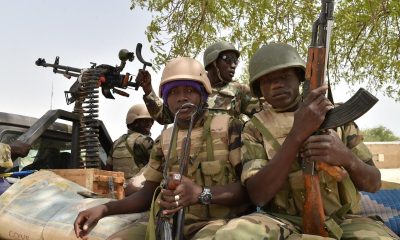
 Top stories11 months ago
Top stories11 months agoGunmen Kill 11 in Southeastern Nigeria Attack, Army Reports
-

 Analysis1 year ago
Analysis1 year agoIsrael and Iran on Edge: Tensions Escalate Amidst Rising Threats
-

 TECH11 months ago
TECH11 months agoZimbabwe Approves Licensing of Musk’s Starlink Internet Service






























